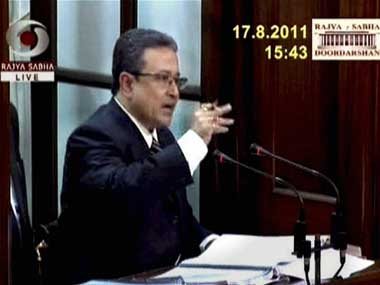By Avirook Sen Who is the most corrupt politician? Take the Firstpost poll. Had Justice Soumitra Sen of the Calcutta High Court consulted even the most incompetent astrologer, he would have been advised that there was nothing short of a cosmic conspiracy against him on 17 August, the day he appeared before the Rajya Sabha to face an impeachment motion for corruption. The proceedings were aired live for the first time. Outside, India’s streets (and the infobahn) were filled with Anna’s Army, whose soldiers have charged themselves with the responsibility of shouting down corruption. That the screen was split between the hearing and the public outcry against corruption in the very institution where it was being carried out was a delicious irony. Had Parliament even made the slightest overture of leniency toward Sen, the hordes would have been at its gates. The spirit of the times sealed the judge’s fate. [caption id=“attachment_63847” align=“alignleft” width=“380” caption=“Justice Soumitra Sen of Calcutta High Court defends himself in the Rajya Sabha during impeachment proceedings against him in New Delhi on Wednesday. PTI”]  [/caption] Sen is charged with misappropriation of funds that were entrusted to him by the courts during litigation. Funds that were eventually to go to the winners of the case, but which were demonstrably used for the payment of his credit card bills, among other things. When ordered by the court, the judge appears to have returned all the money. The judge made his case mainly on points of law (or technicalities, to use a disambiguation), and seemed personally convinced that he was in the clear – but did not appear to have convinced anyone else in the Rajya Sabha. If you listened to both sides of the argument, you would be in no doubt that the Sen was guilty as charged. The BJP’s Arun Jaitley was ruthlessly efficient in identifying the fundamental flaw in Sen’s defence: the non-disclosure of inconvenient truths. Jaitley had opened by saying that the impeachment was an unusual circumstance: that the House was being asked to judge someone who judges others. But he also made a much larger and incontrovertible point:
Judiciary performs a divine function where ordinary humans decide the fate of others. When this divine function of deciding the fate of others is bestowed in a judge, we expect him to perform it with the highest standards of scholarship and utmost impartiality… In this case, when the judge under inquiry says that his offence must be proved ’to the hilt’ or ‘proved beyond reasonable doubt’, he relies on technicalities rather than substance. A judge is like Caesar’s wife. He must be beyond suspicion. Caesar divorced his wife merely on the basis of suspicion. Those who occupy high offices must live through the scrutiny of highest standards of probity. A judge must be beyond suspicion.
Jaitley’s argument seems reasonable: that any individual who sits in judgment on someone must be at least equal or better to the person being judged. But he makes this claim in the context of a historic occasion: the impeachment of a Supreme Court judge. A rare event when the members of Parliament are required to play judges themselves. The context that raises an interesting conundrum: If a judge has to be perceived as being above suspicion then it is logical to say that members of Parliament, who sit in judgement on him, adhere at least to the same standards. Surely a quick look at the faces around him ought have given Jaitley pause. (One quick aside: the last time an impeachment motion was moved against a judge – Justice V Ramaswami of the Supreme Court in 1993 – Kapil Sibal, then a senior advaocate of the Supreme Court, defended him in the Lok Sabha. The motion against Ramaswami fell because the Congress abstained.) But let us grant that every politician or MP isn’t corrupt or perceived to be so. Let us forget cash for votes, 2G and the longish list of other scams for a while. Jaitley’s standard demands personal probity on the part of the judges, but not of the larger system. If we asked merely that “litigants cannot be judged by a judge, who himself is stigmatised,” which of the assembled ‘judges’ would qualify? Let us just pick a few names out of the hat from among that august group charged, incidentally, with a similar responsibility as the judge: the protection of public wealth. And let us test whether these familiar MPs are ‘perceived as above suspicion’, the qualification necessary to sit in judgment on someone like Soumitra Sen.


)
)
)
)
)
)
)
)
)



